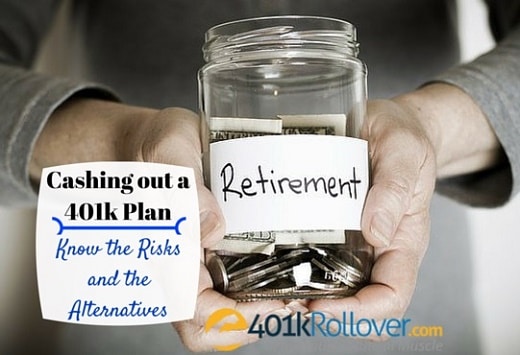
Reasons for Cashing Out a 401k
It’s important to remember that your 401k is the money you have set aside to pay for your future expenses. It is protected if you have to declare bankruptcy, while your other assets are not. Cashing out a 401k before you reach retirement age should be a last resort. Still, if you face any of the following situations, you may choose to cash out your 401k:
- You may need to cash out your 401k to help pay bills while you are unemployed.
- Cashing out a 401k may make sense when you are facing large medical bills.
- You may cash out your 401k when there is a small amount of money in it.
- You might consider cashing out a 401k to save your home or for a down payment on a home.
- Consider a 401k cash out to cover education costs for your spouse or children.
401k Cash Out Basics
Cashing out a 401k is technically allowed when you leave an employer but that doesn’t make it the best financial decision. Understanding a few 401k cash out basics will help you decide if you want to complete the process or seek alternatives.
Cashing out a 401k before you reach the age of 59 1/2 is considered an early withdrawal by the IRS and you’ll pay a 10% penalty on the money you withdraw. You’ll also need to report your 401k cash out as income on your taxes which could force you into a higher tax bracket, seriously putting a dent in the cash you received. You’ll probably only see about 70% of your 401k cash out in the first place as most plan administrators withhold 30% for taxes and penalties.
Steps to Take for Cashing Out a 401k
It can take several weeks to successfully cash out a 401k. You should be prepared to handle a lot of paperwork. It is important to realize that this is not a solution for fast cash and you will only get a portion of your 401k cash out. You will need to begin the process before you need the actual cash.
- Contact the 401k administrator by looking for the number on your 401k statements.
- If you are still employed by the company who offers the 401k, you will not qualify to cash out your 401k, though you may qualify for a 401k loan or an early 401k withdrawals or hardship withdrawal. These options are available on some plans, but not all of them. You can learn more about your specific plan by contacting your human resources representative.
- Fill out the 401k rollover forms that the 401k company sends you. You will need to fill it out as instructed and be prepared to pay taxes on the money that you withdraw.
Penalties and Taxes on Cashing out a 401k
When you complete a 401k cash out, you will need to pay an early withdrawal penalty and 401k taxes on your withdrawal. The 401k early withdrawal penalty is 10% of the amount that you withdraw. You will also be taxed at your normal income rate on the amount that you withdraw. Most plans will withhold 20% of the amount that you withdraw and send it to the IRS to help cover the costs and will send you a 1099-R form. If your tax rate is higher than 10%, then you will need to be prepared to pay additional money when you file your taxes. It is important to be prepared for this possibility.
Alternatives to Cashing Out a 401k
It is highly recommended that you never take a 401k cash out. The money is there to secure your financial independence in retirement. That’s only possible if it’s allowed to grow to meet your income needs. Cashing out just $10,000 at the age of 40 years old will cost you over $60,000 by the time you reach 60 years old assuming a 33% tax bracket and 7% annual return. Taxes and withdrawal penalties would cost you an immediate $4,300 of that amount.
If you need money, there are alternatives to cashing out a 401k. These options are available while you are still working with the employer that manages the 401k.
- Consider a home equity line of credit (HELOC) or other low-interest loan before cashing out a 401k plan. Personal loans and other types can carry high interest rates but may still cost less than the taxes and penalties you’ll pay on a 401k cash out
- Go into emergency spending mode. Cut out all non-essential spending for a few months before considering cashing out a 401k. Talk with your creditors to get extensions where you can and avoid digging yourself deeper in debt
- Borrow or withdraw from Roth IRAs first. You may still be jeopardizing your retirement goals but you’ve already paid taxes on money contributed to a Roth account so it may ultimately be cheaper than a 401k cash out
Hardship Withdrawals on Your 401k Cash Out
You can take a hardship withdrawal if you are facing a serious financial emergency. The hardship withdrawal has the same penalties that you will have when you cash out your 401k, but it does allow you to take out money from the 401k plan to which you are currently contributing. There are various annual limits and rules surrounding the withdrawal that you will have to follow.
Hardship withdrawals on your 401k account are generally allowed before you reach 59 1/2 under the following circumstances:
- You become permanently or completely disabled
- Medical expenses that exceed 7.5% of your gross income
- You need to withdraw from the account to split funds in a divorce
- To pay for your first home or to prevent eviction or foreclosure
Understand that even if you avoid paying the 10% penalty on your 401k withdrawal, you will still need to pay income taxes on the amount you collect.

401k Loans
Another option is to take out a 401k loan. Again, you will need to meet the conditions that will allow you to take out the loan, such as for a down payment on your home. The plan will set up a payment plan, and you will need to pay the loan off in a timely manner. If you are laid off, or change employers, the remaining amount of the loan will be due, or you will face the taxes and early withdrawal penalties on the amounts that you still owe to the company.
Rollover Your 401k instead of Cashing Out
If you are having a difficult time keeping track of your various 401ks or if you want more control over the investments within your retirement plan, you should consider rolling your 401k over into an IRA. This gives you more control over your retirement savings, and can make it easier to track your accounts. You can contact us to find out more about rolling over your 401k and to find the right IRA for you.







